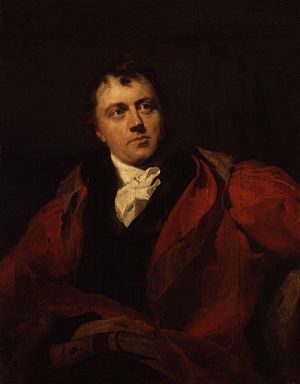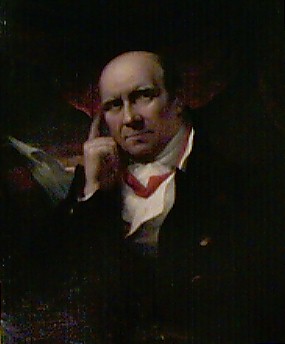James Mackintosh facts for kids
Quick facts for kids
Sir James Mackintosh
|
|
|---|---|

Sir James Mackintosh
—by Sir Thomas Lawrence. |
|
| Born | 24 October 1765 |
| Died | 30 May 1832 (aged 66) |
| Citizenship | United Kingdom of Great Britain and Ireland |
| Education | University of Aberdeen University of Edinburgh |
| Occupation | Political philosopher and politician |
| Political party | Whig |
Sir James Mackintosh (born October 24, 1765 – died May 30, 1832) was an important Scottish thinker. He was a jurist (an expert in law), a Whig politician, and a historian. The Whigs were a political group who believed in more freedom and less power for the king.
Sir James had many talents and interests. He trained as a doctor and a barrister (a type of lawyer). He also worked as a journalist, a judge, a professor, a philosopher (someone who studies big ideas), and a politician.
Contents
Early Life and Education
James Mackintosh was born in Aldourie, Scotland, near Inverness. His father was Captain John Mackintosh. His mother, Marjory MacGillivray, came from an old Highland family. Sadly, his mother died when he was young. His father was often away fighting in the Seven Years' War.
James was raised by his grandmother. He went to school at Fortrose Seminary academy. Even at age thirteen, he was interested in politics. He called himself a Whig and enjoyed debating with his friends. They would pretend to be members of the British Parliament.
In 1780, James went to King's College at the University of Aberdeen. There, he became best friends with Robert Hall, who later became a famous preacher. In 1784, he started studying medicine at the University of Edinburgh. He loved discussing ideas with other students and became friends with Benjamin Constant. He earned his medical degree in 1787.
In 1788, Mackintosh moved to London. He was very interested in the big political events happening there. He was also one of the people who helped start the Society for the Prevention of Cruelty to Animals. This group later became the famous RSPCA, which protects animals.
Standing Up for Ideas: The French Revolution
James Mackintosh soon became very involved in the biggest topic of his time: the French Revolution. In April 1791, he wrote a book called Vindiciae Gallicae. This book defended the French Revolution and its supporters in England. It was a reply to another famous book by Edmund Burke, who was against the revolution.
His book made him famous across Europe. It also helped him become friends with many important people. Because of the success of Vindiciae, he decided to stop being a doctor and become a lawyer instead. He became a barrister in 1795 and quickly gained a good reputation.
Vindiciae Gallicae showed what a thinking liberal person believed about the French Revolution in 1791. Later, the revolution became very violent. This made Mackintosh change his mind and agree more with Burke. But his early book is still important for showing how people felt about human rights back then.
Many people, including the politician Charles James Fox, praised Mackintosh's book. They thought it explained the French Revolution better than other books. The poet Thomas Campbell even said that Mackintosh's book helped spread ideas of freedom and change.
In 1796, Mackintosh wrote to Edmund Burke, telling him that he now agreed with Burke's ideas. Burke invited him to his home, where Mackintosh was amazed by Burke's knowledge. When Mackintosh visited Paris in 1802, people who had admired his book complimented him. He famously replied, "Gentlemen, you have refuted me so well," meaning the revolution's later events had shown him wrong.
A Career in Law
As a lawyer, Mackintosh gave important lectures in 1799 at Lincoln's Inn. These talks were about the laws of nature and nations. The first lecture was published and became very popular. This fame helped him later in his life.
Mackintosh also became famous for a speech he gave in 1803. He defended a French refugee named Jean Gabriel Peltier. Peltier had written things that made Napoleon, who was then the leader of France, very angry. Napoleon sued Peltier for libel (writing something false and damaging).
Even though Mackintosh gave a powerful speech, the jury quickly found Peltier guilty. However, Peltier was never punished because it was seen as a political trial. Mackintosh's speech was published widely and translated into French by Madame de Staël, who became his friend. In 1803, he was given the title of Knight, becoming "Sir James Mackintosh."
Judge in India
After becoming a Knight, Sir James was appointed the chief judge (called a Recorder) of Bombay (now Mumbai) in India. He started this job in 1804.
Within a few months, he started the Bombay Literary Society at his home. This was a group where smart people and friends would meet. They discussed the history, geography, animals, and plants of India. They also talked about its people, languages, customs, and religions. This group later grew into the Asiatic Society of Mumbai.
However, Sir James did not feel at home in India. He became ill and was disappointed with his progress on a history book he wanted to write. So, he was happy to leave India and return to England in November 1811.
A Voice in Parliament
When he returned to England, Sir James was offered a chance to join politics with the ruling Tory party. But he said no. Instead, he joined Parliament in July 1813 as a Whig. He represented Nairn until 1818, and then Knaresborough until he died.
In London and Paris, he was very popular in social circles. He could even keep up with the brilliant conversations of Madame de Staël. He was also good friends with Richard Sharp, another Member of Parliament, and they were part of a Whig social group called the King of Clubs.
Mackintosh's time in Parliament showed his belief in liberalism. He spoke out against harsh laws made by the Tory government. He also worked to change the criminal laws, taking over from Samuel Romilly. He played a big part in allowing Catholic emancipation (giving Catholics more rights) and in the Reform Bill, which changed how people could vote.
However, his ideas about liberalism were still very much "Whig." He didn't agree with the Utilitarians, another group of reformers. He criticized their ideas about human nature and how they wanted to change Parliament.
Teaching and Writing
From 1818 to 1824, Sir James was a professor of law and politics. He taught at the East India Company College in Haileybury. During this time, he was also busy with his parliamentary duties and social life in London.
He felt that his most important work, writing a history of England and contributing to philosophy, was being neglected. It wasn't until 1828 that he truly began his big writing project.
This project was a long essay called Dissertation on the Progress of Ethical Philosophy. It was published in 1831 as part of the Encyclopædia Britannica. He wrote it while often feeling unwell and in short breaks from his work in Parliament. He also wrote a History of England for another series of books.
In 1828, he became a privy councillor, which is a high-ranking advisor to the King. In 1830, he was appointed Commissioner for Indian affairs under the new Whig government.
His Big History Project
Sir James had done a lot of research for a history book about the Glorious Revolution in England. This was a time in 1688 when King James II was removed from power. He collected many notes and materials for this book.
However, he only finished the book up to the point when King James II left the throne. The book was published after Sir James died. His many notes on the Glorious Revolution were later used by another famous historian, Thomas Babington Macaulay. Macaulay used them for his own famous History of the Revolution.
When Mackintosh's book was published in 1834, Macaulay reviewed it. He said it was "decidedly the best history now extant of the reign of James the Second." He praised Mackintosh for his hard work, accuracy, and lively writing style.
Final Years and Legacy
Sir James Mackintosh was initiated into Scottish Freemasonry in Edinburgh in 1785.
He died at his home in London on May 30, 1832, at the age of 66. He had a choking incident involving a chicken bone. Although the bone was removed, he died a month later. He was buried in Hampstead.
A book about his life, written by his son R. J. Mackintosh, was published in 1836. A collection of his other writings, including his essays and speeches, was published in 1846.
The Mackintosh River in Tasmania, Australia, was named after him in November 1828.
Works
- Vindiciæ Gallicæ: A Defence of the French Revolution and its English admirers (1791).
- The Trial of Jean Peltier for Libel against Napoleon Buonaparte (1803).
- Dissertation on the Progress of Ethical Philosophy (1830).
- The Life of Sir Thomas More (1830).
- The History of England (1830–1832, 3 volumes).
- History of the Revolution in England in 1688 (1834).
Family
In 1789, James Mackintosh married Catherine Stuart. Her brother, Daniel, later became an editor for a newspaper called the Morning Post. Catherine was very practical, which helped James, who was not always good with money. His work as a journalist became quite successful. They had a son who died young, and three daughters:
- Mary Mackintosh (1789–1876)
- Maitland Mackintosh (1792–1861)
- Catherine Mackintosh (1795-18??)
After Catherine died in 1797, James married Catherine Allen in 1798. She was related to the famous Wedgwood family. Through her, he introduced the poet Samuel Taylor Coleridge to the Morning Post. They had two sons (one died young) and two daughters:
- Frances Emma Elizabeth Mackintosh (1800–1889)
- Bessy Mackintosh (1804–1823)
- Robert James Mackintosh (1806–1864), who became a colonial governor.
Images for kids
 | John T. Biggers |
 | Thomas Blackshear |
 | Mark Bradford |
 | Beverly Buchanan |




